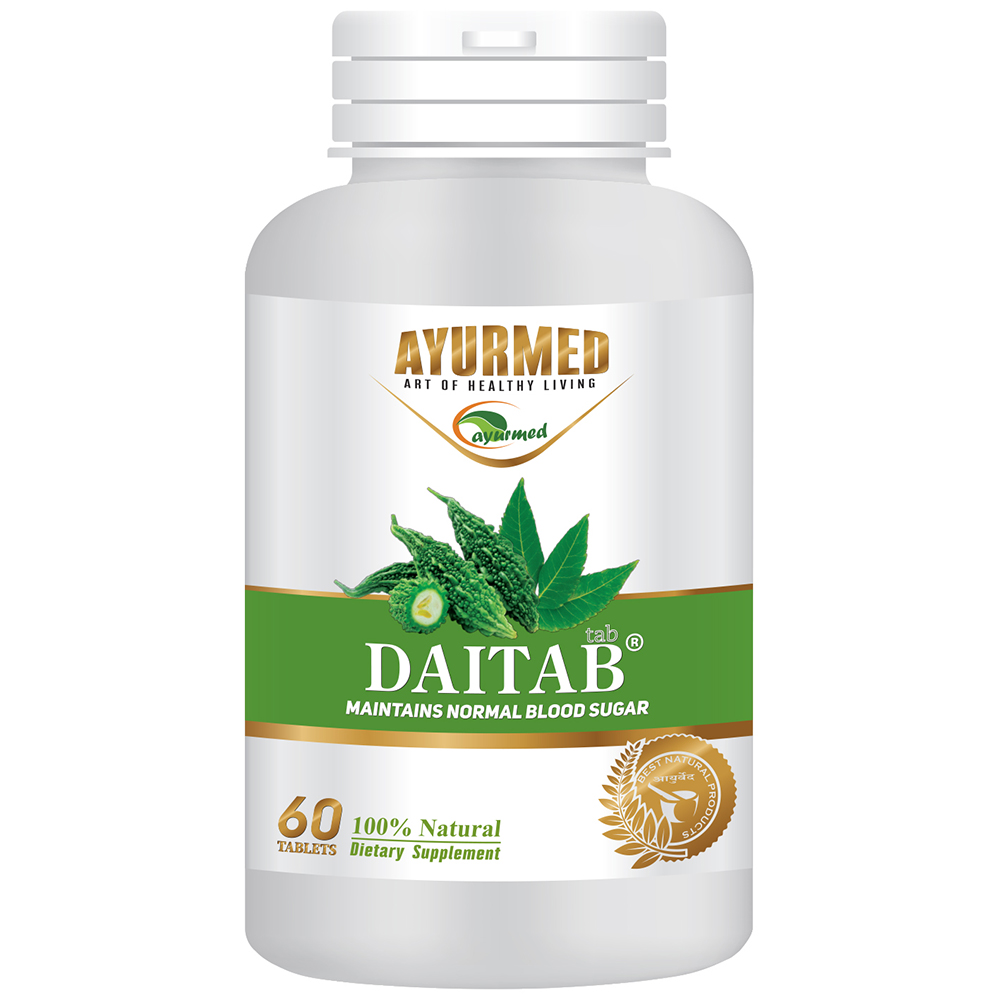The natural dietary supplement DAITAB tablets is a natural product formulated from ayurvedic medicinal herbs which support maintain normal concentrations of blood glucose by regulating insulin secretion from the pancreas, regulating peripheral glucose utilization at cellular level, inhibiting glucose absorption in the intestine, reducing cravings and dependence of sweet. Supports the normal functioning of lipids and protein metabolism that may be deregulated in diabetes. The bioactive substances of herbs contained in DAITAB have a role in preventing chronic complications which are caused by hyperglycemia and manifest in the nervous system, kidneys, and blood vessels of the eyes. Antioxidants contained in herb extracts neutralize free radicals, support immunity and cellular respiration, delay degenerative processes and the evolution of chronic diseases which occur due to the oxidative stress.
DAITAB contributes to:
- maintain blood glucose within normal limits;
- prevent the appearance of chronic complications associated with diabetes;
- maintain a normal protein and lipid metabolism;
- protect the body from oxidative stress that is involved in certain chronic degenerative processes.
Method of administration and recommended dosage:
Suggested dose: As a dietary supplement
Children above 5 years: take ½ (Half) tablet two times a day before meals.
Adults: take 1 (one) tablet two times a day before meals.
Attention: Do not exceed the recommended dose. The dietary supplements should not be used as a substitute for a balanced and varied diet. Pregnant or lactating women and individual with a known medical condition should consult their healthcare professional prior to taking this product or any dietary supplement. This product is a 100% natural dietary supplement and does not contain any preservatives or chemical ingredients. This product is not intended to diagnose, treat, cure, or prevent any disease. Keep out of the reach of children. Store in a cool and dry place. Do not use this product if the seal around cap is missing or broken. During cure monitoring of glycemia is strictly recommended.
- Azadirachta indica (Neem), leaves (10:1) – 75mg;
- Pterocarpus marsupium (Vijayasar), resin (15:1) – 50mg;
- Tinospora cordifolia (Guduchi), stem (10:1) – 50mg;
- Syzygium cumini (Jamun), seeds (8:1) – 50mg;
- Trigonella foenum-graecum (Fenugreek), seeds (15:1) – 50mg;
- Momordica charantia (Bitter melon), fruits (10:1) – 50mg;
- Enicostemma littorale (Chhota chirata), aerial parts ( 10:1) – 50mg;
- Curcuma longa (Turmeric), rhizome (10:1) – 50mg;
- Gymnema sylvestre (Gudmar), leaves (10:1) – 25mg;
- Piper longum (Pipli, Java pepper), fruits (3:1) – 20mg;
- Yashad bhasm (Organic zinc), equivalent to 7 mg Zn/70% RDA – 10mg;
- Acacia arabica (Acacia gum, excipient)(10:1) – 20mg.
- Momordica charantia (Bitter melon) – supports maintenance of blood sugar levels especially in people with diabetes (type I and II) through polypeptide-p that stimulates pancreatic β-cells ensuring an increased secretion of insulin itself. Supports maintaining normal blood level of triglycerides, cholesterol and LDH/LDL ratio. By normalizing glucose levels and maintaining normal levels of blood lipids, chronic complications of diabetes are preventable.
- Syzygium cumini (Jamun) – stimulates the regeneration of pancreatic cells involved in insulin production and controls the transformation of polysaccharides in glucose.
- Azadirachta indica (Neem) – leaves contain a substance (nimbidin) which has the property to reduce serum glucose levels by increasing peripheral glucose receptor responsiveness. It increases the use of glucose or deposition in form of glycogen in the liver, muscles or heart. Reduces total lipids that are deregulated in case of diabetes, providing cardiovascular protection (stops atherogenesis).
- Pterocarpus marsupium (Vijayasar) – the resin reduces glucose absorption from the digestive tract, increases peripheral glucose utilization and supports pancreatic β-cells regeneration, thereby enhances the insulin secretion.
- Tinospora cordifolia (Guduchi) – has hepatoprotective properties, restores normal concentrations of liver enzymes and serum bilirubin. Increases the body’s ability to self-defense against infections. Regenerates pancreatic β-cells, sustaining serum glucose regulation.
- Trigonella foenum-graecum (Fenugreek) – reduces peripheral insulin resistance and enhances insulin secretion.
- Gymnema sylvestre (Gudmar) – increases insulin secretion, increases the ability of cells for glucose utilization, determines the inhibition of glucose absorption in the intestine. Reduces sugar craving and the addiction to sweets, reduces serum levels of cholesterol and triglycerides. It also has diuretic and laxative effects.
- Enicostemma littorale (Chhota chirata) – supports the normal secretion of insulin from pancreas (type II diabetes) and normal levels of blood cholesterol and triglycerides, preventing the appearance of complications associated with diabetes.
- Piper longum (Pipli, Java pepper) – contributes to the absorption of nutritive substances in the digestive tract and enhances intestinal transit. It is a general tonic, helps protect the body against oxidative stress and its adaptation to stressful environmental conditions.
- Curcuma longa (Turmeric) – supports the regulation of cholesterol and triglyceride levels, which are elevated in case of diabetes. Maintains blood glucose levels in case of diabetes by increasing insulin levels (stimulation of pancreatic β-cells) and decreasing peripheral insulin resistance.





